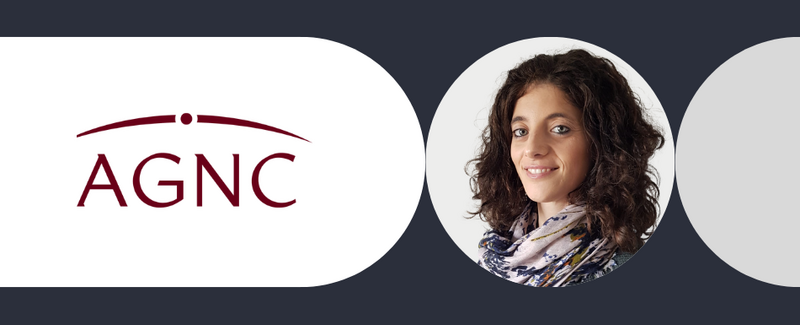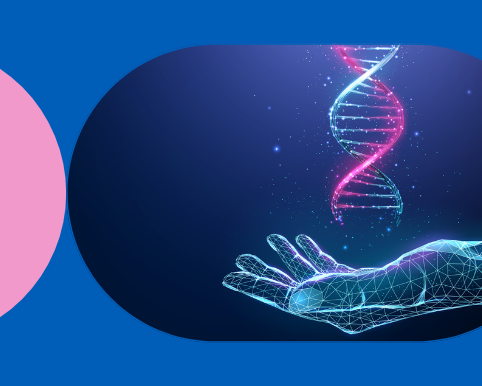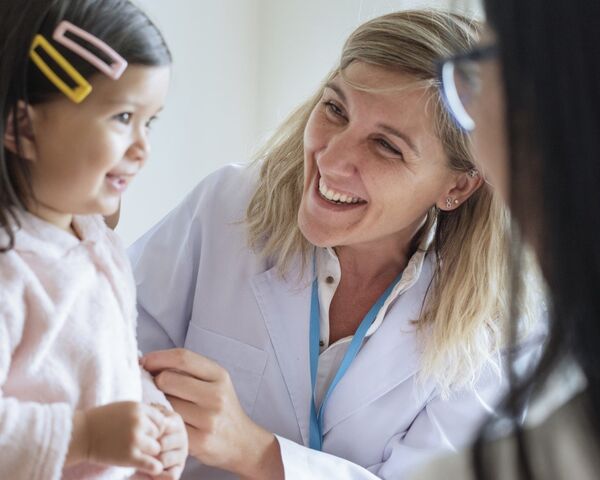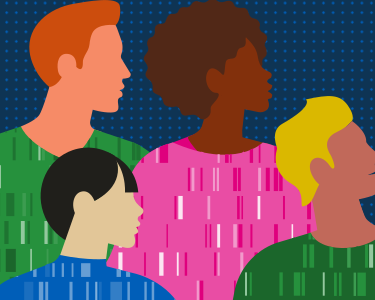Genetic Counsellor Awareness Day 2025: Collaboration, compassion, and celebration
By Roberta Rizzo on
In this blog takeover, Roberta Rizzo, Chair of the Association of Genetic Nurses and Counsellors, shares the values, passion, and expertise that it takes be a genetic counsellor, as well as the vital role they play supporting patients and families.
Celebrating the work of genetic counsellors
As we mark Genetic Counsellor Awareness Day, which falls on the 2nd Thursday of each November, I’m proud to celebrate a profession that blends science, empathy, and communication in such a unique way.
Genetic counsellors help individuals and families to make sense of complex information, often during deeply emotional times. Every day we listen, explain, and support adapting science into understanding, and uncertainty into informed choice, not only for patients, but for professionals working across healthcare.
Being Chair of the Association of Genetic Nurses and Counsellors (AGNC) gives me a front-row seat to the passion and professionalism that defines our community. Genetic Counsellors across the UK are constantly adapting, innovating, and advocating for the people they serve. This year, our focus on connection and collaboration feels especially meaningful.
Strengthening partnerships through our pledge
Genetic counsellors don’t work alone. We’re part of a wider network that includes scientists, clinicians, researchers, and crucially, the genetic charities and patient organisations that support individuals and families every step of the way. Advocacy is almost a buzz word now, but before genetic testing was so widely available, our core competency was purely that – advocacy for the patient.
The AGNC Pledge will be launched on the 13th November to strengthen those partnerships. It’s our public commitment to collaboration - a promise to listen, learn, and work alongside our charity partners to make genetic and genomic information accessible, compassionate, and person-centred. In particular, our emphasis is to immerse those early career genetic counsellors in real life patient situations, where the impact of a genetic condition is felt the most, and allow them to embed this into practice.
Across the country, we see this partnership in action. Genetic counsellors co-develop educational resources, contribute to awareness campaigns, and support family events that help people feel informed and connected.
The real-life impact of genetic counsellors
Claire and Frances both saw genetic counsellors after receiving whole genome sequencing through the NHS. Whilst Claire was in search of a genetic diagnosis for her daughter, Frances hoped to know the cause behind her ovarian cancer. Below they share their experiences with genetic counsellors, and the impact they had on their healthcare journeys.
Our first experience of a genetic counsellor was when we signed up for the 100,000 Genomes Project in 2016. The counsellor explained to us that, although we were hoping to receive a helpful result, we may not actually get a diagnosis that explained our child’s symptoms.
The genetic counselling helped us to understand the possibility that myself and my partner could be carriers of a condition, or equally that we might not be carriers, and that the genetic change was new in our child. It was also explained to us that we may receive additional findings about our risk for other unrelated conditions which we weren't aware of. We were informed that we would be provided with information which could help us with any future family planning decisions.
It was helpful having a genetic counsellor talk us through all of the possible outcomes of participating in the 100,000 Genomes Project, because when we had to wait 3 years to receive a diagnosis, we were able to understand the delay. We went to the results appointment knowing that although we may be told that our child had a rare genetic condition, it was also possible that we may never receive this information. The counsellor prepared us well for the wait and the delivery of results before we eventually received a diagnosis of Okur Chung Neuro Developmental Syndrome in 2019.
Claire
Following a diagnosis of ovarian cancer in March 2023, I was introduced to the Genomic Medicine Service and some of my tumour tissue was submitted for whole genome sequencing. When the results came back, I was offered a genetic counsellor telephone appointment to discuss testing my germline DNA through a blood sample. The genetic counsellor waiting list was a few months long, so I opted to go ahead with the germline testing in advance of that meeting.
When I did get to see a genetic counsellor, she was exceptional. She had an immense knowledge of the genes involved in increased cancer risk and we discussed the possibility of family members who may also be affected. Though the potential consequence to my daughter was a dreadful reality, the genetic counsellor was always factual and compassionate, and gave me guidance on conversations to have.
A few months later I received the blood test results from the oncologist - I had a genetic change in my HRD gene. This time, we discussed my wider family and how to inform my cousins, sister, and mum about the Genomic Medicine Service, and the recommendation to make an appointment via their GPs, or in the case of my mum and daughter, directly to the same regional service.
I remember the phone calls vividly: one whilst in Newcastle attending an Ovacome education day, and the other out for a meal with my dad. The warmth, professionalism, and detailed knowledge gave me much-needed hope, understanding, and confidence to have these difficult conversations. I will remember her amongst the many people I have met during my cancer pathway with respect and appreciation.
Frances
Embracing the future of genomics
Genomics is moving rapidly beyond rare conditions and cancer, into population health and personalised medicine. This shift brings huge opportunities — and equally important challenges.
As genomics becomes part of everyday healthcare, how do we communicate risk clearly? How do we ensure equitable access? And how do we support people to make choices that feel right for them?
Genetic counsellors are ready to lead here. We’re already stepping into new roles in population screening, digital innovation, and education — shaping how genomic information is shared and understood, even on digital platforms. Genetic counsellors are not just part of this evolution; we’re driving it. We are leading in the policy space, navigating how to introduce large scale pathways while still protecting the ethical boundaries and the importance of empathy.
Responding to the NHS Genomics 10-Year Plan
The NHS Genomics 10-Year Plan sets out a bold vision to embed genomics across healthcare. Delivering that vision will depend on professionals who can connect data with care, a role that historically has been successfully delivered by genetic counsellors.
Through the AGNC, we continue to contribute to national discussions on workforce growth, education, ethics, and equitable access. It’s a huge responsibility, but also an exciting opportunity to influence the future of healthcare in meaningful, person-centred ways. Read our response the NHS Genomics 10-year plan here.
Looking Ahead Together
Genetic Counsellor Awareness Day is about more than celebration; it’s a moment to look forward with optimism and purpose. Our profession is growing, our partnerships are deepening, and our impact is expanding.
To my colleagues across the UK, thank you for your dedication, compassion, and creativity. To our partners and patient communities, thank you for your trust, collaboration, and inspiration.
Together, we’re ensuring that as genomics advances, people always remain at its heart.
And finally...
Checkout the Association of Genetic Nurses and Counsellors website, or read more blogs from Genomics England.


